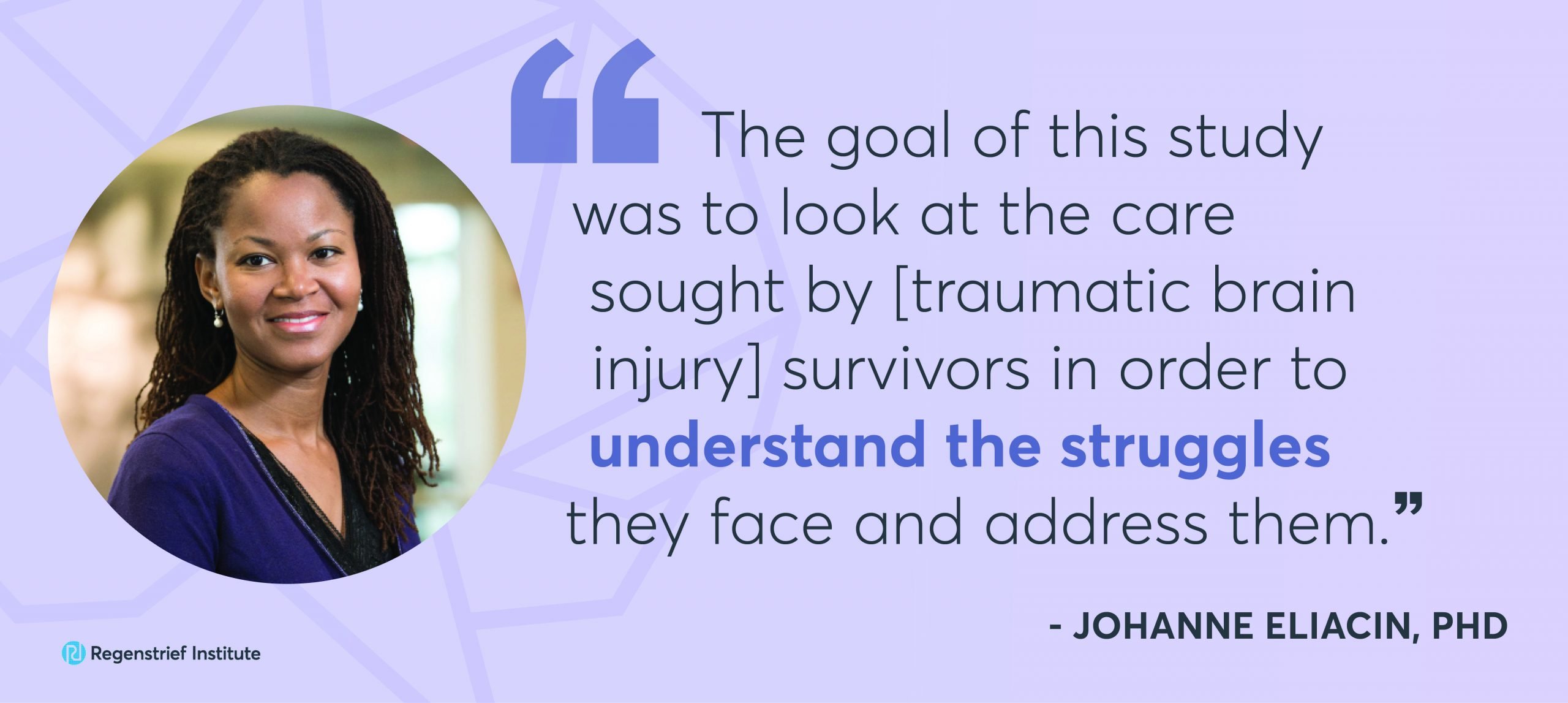Study from VA, Regenstrief and IUPUI first to use TBI registry
Patients who suffer from traumatic brain injuries (TBI) often need a great deal of healthcare services after the injury, but the extent of care utilization is unknown. A new study from research scientists affiliated with the U.S. Department of Veterans Affairs (VA), Regenstrief Institute and IUPUI is one of the first to analyze how much care TBI patients use and identify areas of unmet need.
“There is not a lot of information about traumatic brain injury care utilization available,” said primary study author Johanne Eliacin, PhD, a Regenstrief research scientist and core investigator at the VA Health Services Research and Development Center for Health Information at Richard L. Roudebush VA Medical Center. “In fact, until a few years ago, TBI was viewed as a one-time event. The goal of this study was to look at the care sought by survivors in order to understand the struggles they face and address them.”
The study used the Indiana TBI registry for its cohort. The registry, funded by the Indiana Department of Health, contains all individuals diagnosed with mild, moderate and severe TBI listed in the Indiana Network for Patient Care (INPC), which is managed by Indiana Health Information Exchange. The research team looked at patients who were hospitalized with a TBI from 2005 through 2014 and examined healthcare utilization data for one year after the TBI event. That data was broken down into three categories: emergency department, inpatient and outpatient care.
Researchers found that many TBI survivors needed extensive healthcare services in the year after their injury, and a quarter of them were super-utilizers, having three or more emergency department visits or inpatient encounters or more than 26 outpatient visits during the year.
The results indicate that health insurance impacted the amount and type of care utilized, as did race, gender and residency status. Study authors say these potential disparities are an important area to focus on in future research.
“Because this is one of the first studies looking at these data, we are just beginning to identify patterns,” said Dr. Eliacin. “More work is needed to dig into the social determinants of health that impact a TBI survivor’s outcomes and to understand the struggles faced by those who are high utilizers of the healthcare system.”
A previous qualitative study published by Dr. Eliacin presented some of the challenges patients and caregivers reported, which included the struggle to understand what care was available and where to access it.
“The Indiana TBI registry is an important resource to be able to understand the healthcare journeys of TBI patients,” said study author Brian Dixon, PhD, MPA, Regenstrief and Indiana University Richard M. Fairbanks School of Public Health at IUPUI director of public health informatics. “We can leverage these data to identify population needs and develop interventions to improve quality of life as well as the access to and utility of their care.”
“Characterizing health care utilization following hospitalization for a traumatic brain injury: a retrospective cohort study” was published in the journal Brain Injury.
In addition to Drs. Eliacin and Dixon, authors on the paper are Ziyi Yang, M.S. of IUPUI and Jacob Kean, PhD, of the VA Salt Lake City Health Care System and the University of Utah School of Medicine.
This work was supported, in part, by the Indiana Spinal Cord & Brain Injury Research Fund from the Indiana Department of Health. It was also supported by a VA Rehabilitation Research and Development Career Development Award IK2RX000879 to Dr. Kean.
IHIE is a non-profit, software development organization that operates the INPC—the nation’s largest inter-organizational clinical data repository which houses more than 14 billion pieces of patient data from 95% of Indiana.
About Regenstrief Institute
Founded in 1969 in Indianapolis, the Regenstrief Institute is a local, national and global leader dedicated to a world where better information empowers people to end disease and realize true health. A key research partner to Indiana University, Regenstrief and its research scientists are responsible for a growing number of major healthcare innovations and studies. Examples range from the development of global health information technology standards that enable the use and interoperability of electronic health records to improving patient-physician communications, to creating models of care that inform practice and improve the lives of patients around the globe.
Sam Regenstrief, a nationally successful entrepreneur from Connersville, Indiana, founded the institute with the goal of making healthcare more efficient and accessible for everyone. His vision continues to guide the institute’s research mission.
About the VA Health Services Research and Development Center for Health Information and Communication
The Health Services Research and Development (HSR&D) Center for Health Information and Communication (CHIC) group is a diverse cadre of researchers joining together to transform the healthcare system, both within and outside the VA so every patient receives consistent, high-quality care.
About IUPUI
As Indiana’s premier urban public research university, IUPUI believes in the power of transformation. It is committed to providing educational opportunities that transform the lives of students, the community, and the changing world. It offers more than 450 undergraduate, graduate and professional programs from Indiana University and Purdue University.
About the Richard M. Fairbanks School of Public Health at IUPUI
Located on Indiana’s premier research and health sciences campus, the Richard M. Fairbanks School of Public Health at IUPUI is committed to advancing the public’s health and well-being through education, innovation and leadership. The Fairbanks School of Public Health is known for its expertise in biostatistics, epidemiology, cancer research, community health, environmental public health, global health, health policy and health services administration.
About Johanne Eliacin, PhD
In addition to being a research scientist at Regenstrief Institute, Johanne Eliacin, PhD, is a core investigator at the U.S. Department of Veterans Affairs Health Services Research and Development Center for Health Information and Communication, Richard L. Roudebush VA Medical Center. She is also a research scientist at the Indiana Alzheimer’s Disease Research Center.
About Brian E. Dixon, PhD, MPA
In addition to his role as Regenstrief Institute and Indiana University Richard M. Fairbanks School of Public Health at IUPUI director of public health informatics, Brian E. Dixon, MPA, PhD, is a research scientist at Regenstrief and an associate professor of epidemiology at the Fairbanks School of Public Health. He is also an affiliate scientist at the U.S. Department of Veterans Affairs Health Services Research and Development Center for Health Information and Communication, Richard L. Roudebush VA Medical Center.










